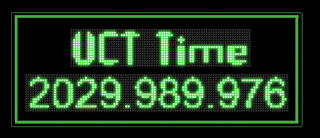* Interplanetary Time *
Before we step out into space with the intent to colonize the moons and planets in our solar system we should pre-determine as many aspects of the venture as possible. These pre-determinations should not be set in stone but provide a common framework or foundation upon which to build. This blog has presented many concepts and considerations and colonial time format is another concept to be considered, and pre-determined.
The concept of universal colonial time needs to address when to start the clock, what format should the time delineation take, and should this also include the development of a “universal” calendar.
The UCT time format should not be designed to enforce a standard on each individual planet or moon but to provide a common time reference. Trying to develop one standard for all measures of time would not be very successful as each planet has its own sidereal rotation.
Earth currently has a UTC or Universal Time Code in place across the numerous time zones but it would be difficult to adapt to a colonial purpose because it is based on Earths sidereal periods.
This UTC, also referred to as Coordinated Universal Time was called Greenwich Mean Time (GMT) prior to 1972. It is also known as "Z time" or "Zulu Time and is the primary time standard by which the world regulates clocks and time. To ensure accuracy of this time keeping, the mechanisms for time keeping have progressed and have become more and more accurate as technological abilities advance.

Comments
Post a Comment